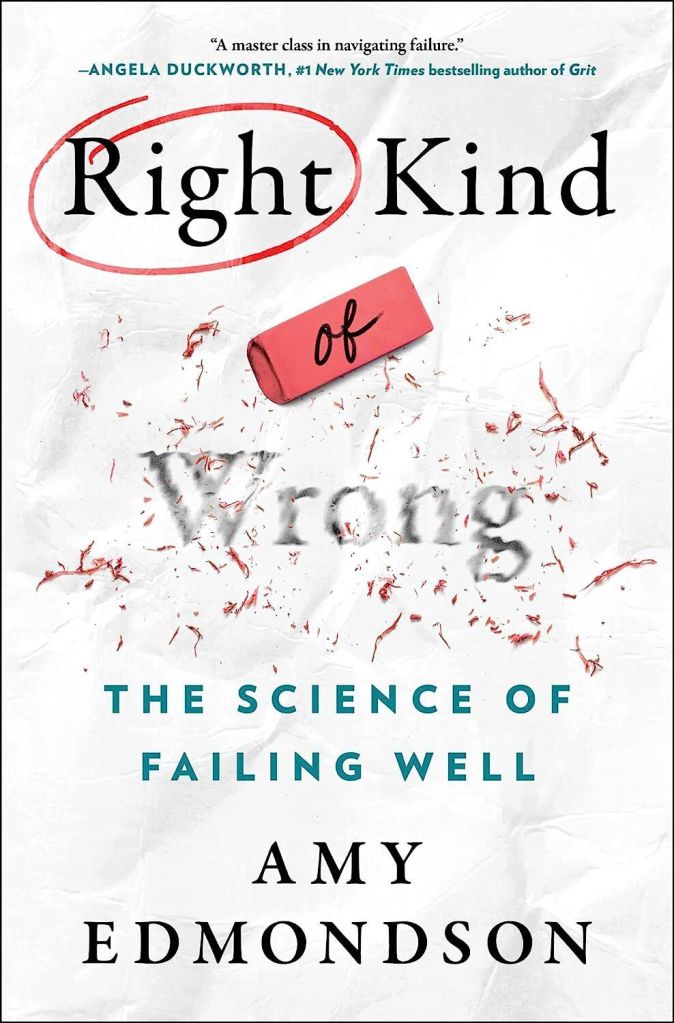‘Right Kind of Wrong’ teaches how to fail
Published 6:15 am Sunday, August 6, 2023

- Cover
“Right Kind of Wrong: The Science of Failing Well,” by Amy Edmondson. New York, NY: Atria Books (an imprint of Simon & Schuster). 2023. 368 pages. $28.99 (hardcover).
“The idea that people and organizations should learn from failure is popular and even seems obvious,” Amy Edmondson observes near the beginning of “Right Kind of Wrong: The Science of Failing Well,” her in-depth exploration of an experience many of us know all too well. “But most of us fail to learn the valuable lessons failure can offer. We put off the hard work of reflecting on what we did wrong.
Trending
“Sometimes we’re reluctant to admit that we failed in the first place.” “We’re embarrassed by our failures and quick to spot those of others. We deny, gloss over, and quickly move on from – or blame circumstances and other people for – things that go wrong. Every child learns, sooner or later, to dodge blame by pointing the finger elsewhere. Over time, this becomes habitual.”
So begins a fascinating and ultimately enlightening literary journey into the science of failure. As the author makes abundantly clear, one of the primary motivations for delving into this topic was her own experience with disappointment throughout her life and career. Honestly, the way Edmondson humanizes a process we have all encountered multiple times is one of the most endearing features of this volume. I could instantly relate to many of the stories she provides in such a crisp and refreshing manner.
One of the more extensively researched books I’ve had occasion to peruse recently, Edmondson’s treatise has 37 pages of source notes at the conclusion of the prologue, introduction and eight chapters that form the main narrative. Structurally, the manuscript is arranged in two major sections: Part One: The Failure Landscape, which consists of the first four chapters, and Part Two: Protecting the Science of Failing Well, which is comprised of the final four chapters. The prose is engaging and fluid, a seamless integration of practical advice backed up by solid research. The author provides useful insights in a naturally engaging format; I found something interesting and applicable on virtually every page.
One of the more charming anecdotes (at least to me) came from “Eureka!” – the second chapter and one of my personal favorites. Here, Edmondson explains how Amy Webb, a person Forbes magazine once named one of the Fifty Women Changing the World, went about trying to find a life partner using an online dating site. When entering her profile, she described herself as “an award-winning journalist, speaker and thinker” who had spent “12 years working with digital media and now advises various startups, retailers, government agencies and media organizations all over the world.” For fun, she listed “JavaScript and monetization.”
Her first attempt did not go well: “One of her few dates was dinner with an IT professional. At the restaurant, he ordered multiple items from on and off the menu: appetizers, entrees, and several bottles of wine. Throughout their date, dish after dish arrived at their table. The conversation was bland. When the bill came, her date got up from the table, said he was going to the men’s room, and never returned! Webb paid a bill nearly equal to an entire month’s rent for her at the time. Clearly, a failure. One from which she was determined to learn.”
After carefully reflecting on the disaster and analyzing it from all angles, she revised her approach: “Armed with new knowledge, she ran a second experiment, this time reverse engineering a new profile that, while genuine, was what she called ‘optimized’ for the new ecosystem of online dating. Having learned that she was more than her resume, she described herself as ‘fun’ and ‘adventurous.’ She waited twenty-three hours before answering any messages. She posted new photographs of her wearing clothing that revealed rather than concealed her figure. This second profile was a smashing success. She found, met, dated and married the man who became the love of her life and the father of their daughter. Webb maintains that her success was due to cracking the algorithmic code the site used. But she would not have cracked that code had she not first been willing to learn from failure and persevere.”
Trending
The book is literally chock full of these kinds of illustrative examples, both personal and professional. Edmondson classifies failures into three broad categories: intelligent, basic and complex – and then goes on to articulate how to identify each. She sees intelligent failures as the most relevant for eventual success, but also notes that they are the rarest kind. I was particularly intrigued by her discussion of the three reasons most of us fail at failure: aversion, confusion and fear. Not content just to quantify and investigate the different types of failure, however, the author spends more time dissecting the various strategies that can be employed to counteract them. From my vantage point, this is where the book really shines.
The Novartis Professor of Leadership and Management at the Harvard Business School, Edmondson earned three degrees (bachelor’s, master’s, and a doctorate) from Harvard University. Named by Thinkers50 in 2021 as the #1 Management Thinker in the world, her work has appeared in The New York Times, The Wall Street Journal, Financial Times, Psychology Today, Fast Company, and Harvard Business Review.
Moreover, her TED Talk, “How to Turn a Group of Strangers into a Team,” has been viewed over three million times. Her previous books include “Teaming: How Organizations Learn,” “Innovate, and Compete in the Knowledge Economy (2012),” “Building the Future: Big Teaming for Audacious Innovation,” with Susan Salter Reynolds (2016) and “The Fearless Organization: Creating Psychological Safety in the Workplace for Learning, Innovation, and Growth (2018).”
Along with the inherent implications for work and business, I was really drawn to the way her ideas have application on a more interpersonal level. Witness the following from “Thriving as a Fallible Human Being,” the final chapter:
“Understand that when you do something wrong – with or without intent – a rupture occurs in that intangible thing that exists between you and another person. The role of an apology is to repair that rupture. A good apology signals that you put the relationship ahead of your ego. Indeed, effective apologies send a clear message that you care about the other person. Effective apologies do more than repair a relationship; they can deepen and improve it. By the same token, a bad apology makes things worse.”
Been there. Done that. Got the T-shirt.
As Tom Peters, celebrated co-author of In Search of Excellence (and one of my personal heroes) notes, “No topic is more important that the assessment and understanding of failure. Amy Edmondson has broken entirely new ground; and for those who take the trouble, I no less than guarantee Right Kind of Wrong will be a ‘game-changer.’ The result of serious study and application of this tome will be one of the most important steps in your professional life.”
I could not have said it better or agree more. Highly recommended.
—Reviewed by Aaron W. Hughey, University Distinguished Professor, Department of Counseling and Student Affairs, WKU.







